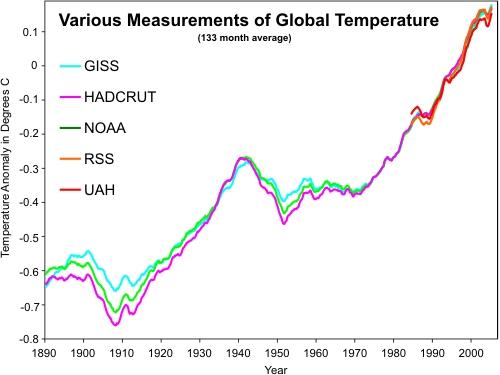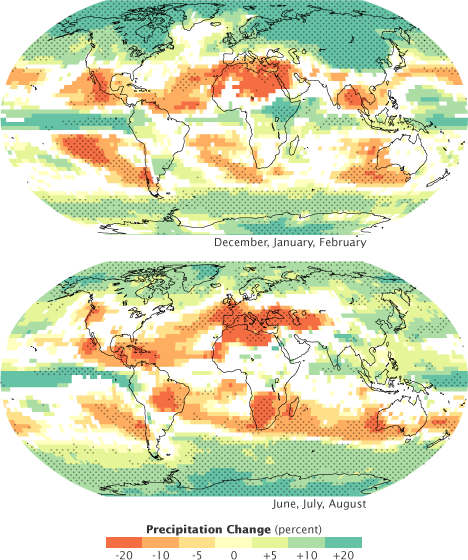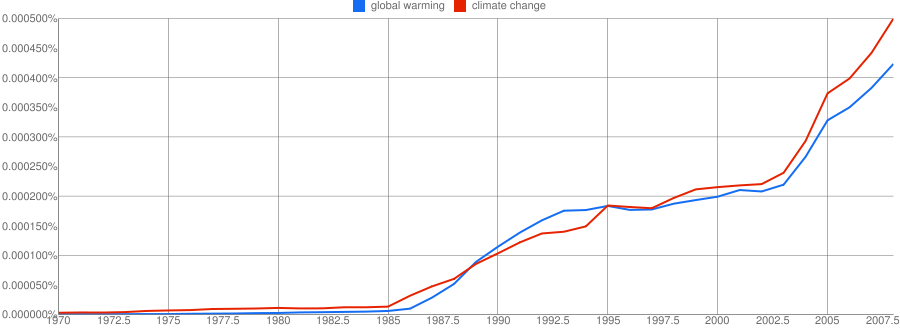What's in a Name?
Posted on 6 January 2011 by dana1981
There have long been claims that some unspecificed "they" has "changed the name from 'global warming' to 'climate change'". In reality, the two terms mean different things, have both been used for decades, and the only individual to have specifically advocated changing the name in this fashion is a global warming 'skeptic'.
Global Warming vs. Climate Change
Both of the terms in question are used frequently in the scientific literature, because they refer to two different physical phenomena. As the name suggests, 'global warming' refers to the long-term trend of a rising average global temperature, which you can see here:

'Climate change', again as the name suggests, refers to the changes in the global climate which result from the increasing average global temperature. For example, changes in precipitation patterns, increased prevalence of droughts, heat waves, and other extreme weather, etc. These projections of future global precipitation changes from the 2007 IPCC report are an example of climate change:

Thus while the physical phenomena are causally related, they are not the same thing. Human greenhouse gas emissions are causing global warming, which in turn is causing climate change. However, because the terms are causally related, they are often used interchangeably in normal daily communications.
Both Terms Have Long Been Used
The argument "they changed the name" suggests that the term 'global warming' was previously the norm, and the widespread use of the term 'climate change' is now. However, this is simply untrue. For example, a seminal climate science work is Gilbert Plass' 1956 study 'The Carbon Dioxide Theory of Climatic Change' (which coincidentally estimated the climate sensitivity to a doubling of atmospheric carbon dioxide at 3.6°C, not far off from today's widely accepted most likely value of 3°C). Barrett and Gast published a letter in Science in 1971 entitled simply 'Climate Change'. The journal 'Climatic Change' was created in 1977 (and is still published today). The IPCC was formed in 1988, and of course the 'CC' is 'climate change', not 'global warming'. There are many, many other examples of the use of the term 'climate change' many decades ago. There is nothing new whatsoever about the usage of the term.
In fact, according to Google Books, the usage of both terms in books published in the United States has increased at similar rates over the past 40 years:

And a Google Scholar search reveals that in the scientific literature, the term 'climate change' was in use before the term 'global warming', and has always been the more commonly-used term in scientific publications:
No Reason to Change the Term
Those who perpetuate the "they changed the name" myth generally suggest two reasons for the supposed terminology change. Either because (i) the planet supposedly stopped warming, and thus the term 'global warming' is no longer accurate, or (ii) the term 'climate change' is more frightening.
The first premise is demonstrably wrong, as the first figure above shows the planet is still warming, and is still accumulating heat. Quite simply, global warming has not stopped.
The second premise is also wrong, as demonstrated by perhaps the only individual to actually advocate changing the term from 'global warming' to 'climate change', Republican political strategist Frank Luntz in a controversial memo advising conservative politicians on communicating about the environment:
It’s time for us to start talking about “climate change” instead of global warming and “conservation” instead of preservation.
“Climate change” is less frightening than “global warming”. As one focus group participant noted, climate change “sounds like you’re going from Pittsburgh to Fort Lauderdale.” While global warming has catastrophic connotations attached to it, climate change suggests a more controllable and less emotional challenge.
Summary
So to sum up, although the terms are used interchangeably because they are causally related, 'global warming' and 'climate change' refer to different physical phenomena. The term 'climate change' has been used frequently in the scientific literature for many decades, and the usage of both terms has increased over the past 40 years. Moreover, since the planet continues to warm, there is no reason to change the terminology. Perhaps the only individual to advocate the change was Frank Luntz, a Republican political strategist and global warming skeptic, who used focus group results to determine that the term 'climate change' is less frightening to the general public than 'global warming'. There is simply no factual basis whatsoever to the myth "they changed the name from global warming to climate change".
This post is the Intermediate rebuttal (written by Dana Nuccitelli [dana1981]) of the skeptic argument "They changed the name from global warming to climate change".































 Arguments
Arguments






























Hiding the Spike!
I notice that the above Ngrams only start in 1979. Looking at the full scale I found a spike at round 1900! Now that's clearly before the industrial revolution and this must prove that both GW and CC and not caused by CO2.warmists might try to look at the books at the books in this selection and will probably suggest that it's largely a glitch in the google but wouldn't this just prove that science is unreliable?
I've looked at some of the book and notice that many entries are due to sentences like: "be subjected to wet and cold, change of climate, change in occupation, increased or decreased work"... now "climate, change" happens quite often in this spike... to often to be coincidence... this, I believe, is the work of aliens, or the New World Order, or aliens working with the NWO...
Apologies, I'm feeling quite flippant these days, please feel free to delete this post as being off-hominem.